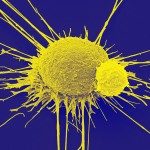Lien vers Pubmed [PMID] – 14962190
Immunol. Rev. 2004 Feb;197:102-15
In adult mice, the number of B lymphocytes remains constant under homeostatic control, in spite of the fact that B cells are produced continuously in numbers that largely exceed the number required to replenish the peripheral pools. It follows that each newly formed lymphocyte can only persist if another lymphocyte dies. In an immune system where the total number of cells is limited, cell survival is no longer a passive phenomenon but rather a continuous active process where each lymphocyte must compete with other lymphocytes to survive. Consequently, the number and the life expectancy of a B-cell clone vary according to the presence or absence of competitor populations. This process of lymphocyte competition is likely controlled by a common need for resources that are in limited supply. The number of peripheral B-cells varies according to the availability of B-cell receptor (BCR) ligands. Indeed, it is possible to modify steady-state B-cell numbers by antigen manipulation. Moreover, conventional self-reactive B cells can undergo positive selection. We showed that the fate of a self-reactive B cell is determined by the quantity of self-antigens, the number of antigen-specific receptors engaged, and its overall antigen-binding avidity rather than the affinity of individual BCRs.

